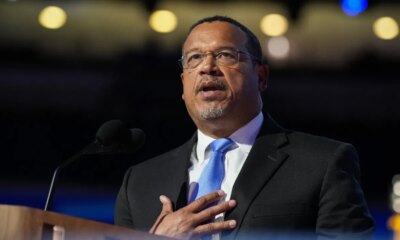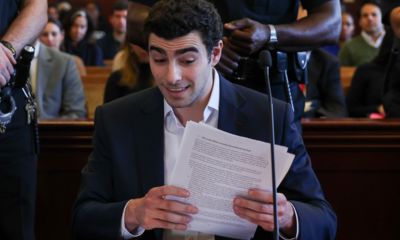Politics
Democratic Party chair Rusty Hicks assailed as outsider in bid for North Coast Assembly seat

At first glance, the Sonoma County Democratic Party’s 36th annual Crab Feed seemed the political schmoozefest it has been for nearly four decades.
For $70, Sonoma County residents could “bump elbows with elected officials” over a North Coast meal of Dungeness crab, salad and pasta served with locally produced red and white wines. But Democratic discord simmered beneath the pleasantries at the Feb. 23 decapod dinner.
The intraparty squabble involves who will replace Assemblymember Jim Wood (D-Healdsburg), who is retiring from his North Coast seat two years before most people expected. The shocking November announcement that Wood wouldn’t seek reelection for his final term after 10 years in the statehouse sent candidates scrambling to prop up campaigns with only a few months to raise money and support before Tuesday’s primary.
In his bid for State Assembly, Santa Rosa Councilmember Chris Rogers has emphasized his leadership in helping guide the region through drought, wildfires and the COVID-19 pandemic.
(Josh Edelson / For The Times)
Three top candidates quickly emerged: California Democratic Party Chair Rusty Hicks, Healdsburg City Councilmember and nonprofit executive Ariel Kelley as well as former Santa Rosa mayor and current Councilmember Chris Rogers.
Disagreement among local Democratic leaders over who should represent Assembly District 2 — a left-leaning, geographically diverse region stretching from Santa Rosa to the Oregon border — has transformed the race into one of the most expensive and divisive in local history.
The Democratic trio are competing for a top-two placement in the March 5 primary, likely alongside the only Republican in the race who conceivably has enough GOP votes in the district to send him to the November general election. A majority of the district’s voters are registered Democrats, so the Democratic candidate who makes it through the primary has a good chance of winning in November.
The district spans five counties — part of Sonoma plus all of Mendocino, Trinity, Humboldt and Del Norte — a roughly seven-hour drive from top to bottom. It takes in 307,000 voters, many of them working-class, across its rural geography. Many residents contend with a shortage of affordable housing, well-paying jobs and limited healthcare access. The region faces growing environmental threats, including deadly wildfires exacerbated by climate change.
The intensive jockeying among candidates to gain traction with voters was evident at the crab event.
“Vote Chris Rogers” buttons competed with “ARIEL” stickers, while Hicks sponsored a table prominently positioned at the front of the hall, where he sat across from Wood and Assembly Speaker Robert Rivas (D-Hollister).
A supporter wears a pin advocating Chris Rogers for State Assembly at a crab-eating event in Santa Rosa.
(Josh Edelson / For The Times)
Much of the political brouhaha revolves around Hicks, 44, who moved to the region from Los Angeles only a few years ago — a blip in time by some local standards — but who brings with him considerable funding and clout. He is endorsed by outgoing Assemblymember Wood, Gov. Gavin Newsom, U.S. Sen. Laphonza Butler, veterans groups and a long list of powerful statewide labor organizations, among others.
Hicks is proving a formidable candidate. He’s a Texas native and Afghanistan War veteran who was president of the Los Angeles County Federation of Labor before being elected Democratic Party chair in 2019. His reputation as a skilled strategist and even-keeled leader in the labor movement helped him dominate that race as the party looked to correct course in the aftermath of an internal sexual misconduct scandal.
His campaign messaging centers on safeguarding district jobs, creating more affordable housing options and expanding access to healthcare in a region with few medical clinics. He has also emphasized environmental preservation, an issue that resonates in a region home to towering redwoods and vast state and national parkland.
“I’m running because I’ve got a long track record of delivering real results for real people,” Hicks said.
Rusty Hicks, chair of the California Democratic Party and a longtime Los Angeles labor leader, says he and his wife moved to Humboldt County in 2021, after falling in love with the area. Opponents to his Assembly bid question his North Coast credentials.
(Josh Edelson / For The Times)
His opponents describe him in a different light.
Skeptics accuse Hicks of carpetbagging his way from Los Angeles to Humboldt County with ambitions to run for office, and have blasted his long list of donations from Southern California and Sacramento as evidence that he lacks connections to the people he wants to represent.
He’s also faced criticism for maintaining his influential position as party chair while campaigning for Assembly. Hicks said he has suspended his pay and benefits during the race and pledged to step down if elected.
Hicks said he and his wife bought their home in Arcata in Humboldt County in 2021 after falling in love with the North Coast while he was running for party chair. His campaign, he said, is “funded by individuals and workers and the unions that represent them,” a coalition that many backing his candidacy say no Democrat should be criticized for.
Hicks faces a strong opponent in Kelley, 41, a former mayor of Healdsburg, whose endorsements include local government officials and statewide groups dedicated to electing more women to office and expanding access to safe abortion services.
A political action committee supporting Kelley — largely funded by her sister, who poured at least $200,000 into the PAC — has sponsored ads accusing Hicks of covering up sexual harassment in the Democratic Party, an allegation he and his proponents angrily deny. His campaign sent local TV stations cease-and-desist letters warning them against continuing to run ads that Hicks maintains are “patently false.”
Hicks has clapped back with criticism of Kelley’s investments in the oil industry and questioned her connections to a local developer who recently donated $50,000 to the political action committee.
“It’s unfortunate when some candidates and their supporters conclude that they can no longer talk about their own record or run on their own record and decide to lie about mine,” Hicks said.
Kelley said she doesn’t communicate with the PAC or her sister about its strategy, and agrees the negative campaigning is unhelpful. She said her father died last year and left her a trust that held investments “in a number of industries,” and that she plans to divest from those in oil and gas.
Ariel Kelley, a former mayor of Healdsburg, is one of the Democratic candidates for a North Coast Assembly seat. She is endorsed by local government officials and statewide groups dedicated to electing more women to office.
(Josh Edelson / For The Times)
She’s called the attacks “completely baseless” and a distraction from real issues facing district voters, such as the need for paid family leave for rural families, ensuring access to reproductive healthcare, improving housing affordability and reducing homelessness.
“I’m really focused on just talking about my record of delivering. Because it’s a very strong record of delivering for this community, on homelessness, on wildfire prevention, on housing, healthcare access,” she said.
Rogers, 36, who has also mounted a fierce campaign, has called for his opponents to end the “mud-slinging,” even as he’s expressed many of the same concerns about Hicks’ fundraising strategies.
Raised in Sonoma County, Rogers worked for a decade as an aide to congressional and state legislators in the district before launching his career in local politics. He contends he is most qualified to represent the district after steering the region through emergency after emergency as Santa Rosa’s mayor and during his time on the City Council, including the COVID-19 pandemic, a drought, flooding and devastating wildfires.
Rogers is endorsed by Senate President Pro Tem Mike McGuire (D-Healdsburg), whom he worked for as a legislative staffer, and a long list of city and county officials, a local firefighters group and environmental organizations. He said he’s focused on mitigating climate change, protecting local healthcare facilities from closing and addressing a critical narrowing of access to homeowners insurance in Northern California communities.
“I have that experience. Not just understanding the perspective, but how to translate needs in the district into legislative action,” Rogers said.
Yurok Tribe Vice Chair Frankie Myers, 43, is also running as a Democrat, hoping to become the second Native American elected to the California statehouse. Myers has received support from tribal communities throughout the state.
He’s tried, with limited success, to break through the bickering with his message about elevating tribal issues and the importance of environmental stewardship and universal healthcare.
“I’m learning it is a privilege running for state Legislature. It has a lot of barriers for low-income people, people from historically disadvantaged communities,” he said. “We’ve only had one single elected Native American in the state Legislature in the history of this state. And now having campaigned, there’s some realizations I’m coming to about why that is.”
Frankie Myers, vice chair of the Yurok Tribe, is hoping to be the second Native American elected to the California Legislature.
(Josh Edelson / For The Times)
A fifth Democrat, Mendocino County Supervisor Ted Williams, hasn’t raised money and is in effect using his campaign to encourage candidates to focus on rural issues. A sixth Democratic candidate, Cynthia Click, has withdrawn from the race, though her name will appear on the ballot.
Michael Greer, the one Republican running for the seat, has focused his campaign on bread-and-butter issues familiar to many California families, including public safety, the rising numbers of people living homeless and spiraling housing costs, along with North Coast-specific concerns similar to those raised by the other candidates.
“As one vote, as one Republican, can I change the votes on all these things?” Greer said of his potential effect in the Democratic-led Assembly. “No. But I can be loud enough to make sure that the rural areas are heard.”
Santa Rosa’s 36th annual Crab Feed gave voters a chance to meet leading candidates in the bid to represent residents in the geographically diverse Assembly District 2, which spans California’s North Coast.
(Josh Edelson / For The Times)
Wood said many of the candidates are using overly broad rhetoric to describe the district’s challenges and seem unfamiliar with the progress he’s made in addressing specific policy areas during his decade in Sacramento. The real challenge, he said, will be building on his successes to fine-tune those policies.
“It’s a hugely challenging district,” Wood said. “So you have to really commit to spending the time to learn it and to respect it to be able to help solve some of the problems that we face.”
Wood was quick to endorse Hicks’ bid for Assembly, saying he was confident the party chair would be a “workhorse” for the district.
“I respect anybody who wants to run here, but I think the depth and breadth of his experience and the things he’s done and his life experience make him the best candidate,” Wood said.
Wood noted, however, that he’s been surprised and disappointed by the negative campaigning.
“This is not what we’re used to on the North Coast,” he said. “I don’t like it, and I don’t think voters really like it either.”

Politics
Trump signs order to protect Venezuela oil revenue held in US accounts

NEWYou can now listen to Fox News articles!
President Donald Trump has signed an executive order blocking U.S. courts from seizing Venezuelan oil revenues held in American Treasury accounts.
The order states that court action against the funds would undermine U.S. national security and foreign policy objectives.
CLICK HERE TO DOWNLOAD THE FOX NEWS APP
President Donald Trump is pictured signing two executive orders on Sept. 19, 2025, establishing the “Trump Gold Card” and introducing a $100,000 fee for H-1B visas. He signed another executive order recently protecting oil revenue. (Andrew Harnik/Getty Images)
Trump signed the order on Friday, the same day that he met with nearly two dozen top oil and gas executives at the White House.
The president said American energy companies will invest $100 billion to rebuild Venezuela’s “rotting” oil infrastructure and push production to record levels following the capture of Venezuelan dictator Nicolás Maduro.
The U.S. has moved aggressively to take control of Venezuela’s oil future following the collapse of the Maduro regime.
This is a developing story. Please check back for updates.
Politics
Column: Some leaders will do anything to cling to positions of power

One of the most important political stories in American history — one that is particularly germane to our current, tumultuous time — unfolded in Los Angeles some 65 years ago.
Sen. John F. Kennedy, a Catholic, had just received his party’s nomination for president and in turn he shunned the desires of his most liberal supporters by choosing a conservative out of Texas as his running mate. He did so in large part to address concerns that his faith would somehow usurp his oath to uphold the Constitution. The last time the Democrats nominated a Catholic — New York Gov. Al Smith in 1928 — he lost in a landslide, so folks were more than a little jittery about Kennedy’s chances.
“I am fully aware of the fact that the Democratic Party, by nominating someone of my faith, has taken on what many regard as a new and hazardous risk,” Kennedy told the crowd at the Memorial Coliseum. “But I look at it this way: The Democratic Party has once again placed its confidence in the American people, and in their ability to render a free, fair judgment.”
The most important part of the story is what happened before Kennedy gave that acceptance speech.
While his faith made party leaders nervous, they were downright afraid of the impact a civil rights protest during the Democratic National Convention could have on November’s election. This was 1960. The year began with Black college students challenging segregation with lunch counter sit-ins across the Deep South, and by spring the Student Nonviolent Coordinating Committee had formed. The Rev. Martin Luther King Jr. was not the organizer of the protest at the convention, but he planned to be there, guaranteeing media attention. To try to prevent this whole scene, the most powerful Black man in Congress was sent to stop him.
The Rev. Adam Clayton Powell Jr. was also a warrior for civil rights, but the House representative preferred the legislative approach, where backroom deals were quietly made and his power most concentrated. He and King wanted the same things for Black people. But Powell — who was first elected to Congress in 1944, the same year King enrolled at Morehouse College at the age of 15 — was threatened by the younger man’s growing influence. He was also concerned that his inability to stop the protest at the convention would harm his chance to become chairman of a House committee.
And so Powell — the son of a preacher, and himself a Baptist preacher in Harlem — told King that if he didn’t cancel, Powell would tell journalists a lie that King was having a homosexual affair with his mentor, Bayard Rustin. King stuck to his plan and led a protest — even though such a rumor would not only have harmed King, but also would have undermined the credibility of the entire civil rights movement. Remember, this was 1960. Before the March on Washington, before passage of the Voting Rights Act, before the dismantling of the very Jim Crow laws Powell had vowed to dismantle when first running for office.
That threat, my friends, is the most important part of the story.
It’s not that Powell didn’t want the best for the country. It’s just that he wanted to be seen as the one doing it and was willing to derail the good stemming from the civil rights movement to secure his own place in power. There have always been people willing to make such trade-offs. Sometimes they dress up their intentions with scriptures to make it more palatable; other times they play on our darkest fears. They do not care how many people get hurt in the process, even if it’s the same people they profess to care for.
That was true in Los Angeles in 1960.
That was true in Washington, D.C., on Jan. 6, 2021.
That is true in the streets of America today.
Whether we are talking about an older pastor who is threatened by the growing influence of a younger voice or a president clinging to office after losing an election: To remain king, some men are willing to burn the entire kingdom down.
YouTube: @LZGrandersonShow
Politics
Federal judge blocks Trump from cutting childcare funds to Democratic states over fraud concerns

NEWYou can now listen to Fox News articles!
A federal judge Friday temporarily blocked the Trump administration from stopping subsidies on childcare programs in five states, including Minnesota, amid allegations of fraud.
U.S. District Judge Arun Subramanian, a Biden appointee, didn’t rule on the legality of the funding freeze, but said the states had met the legal threshold to maintain the “status quo” on funding for at least two weeks while arguments continue.
On Tuesday, the U.S. Department of Health and Human Services (HHS) said it would withhold funds for programs in five Democratic states over fraud concerns.
The programs include the Child Care and Development Fund, the Temporary Assistance for Needy Families program, and the Social Services Block Grant, all of which help needy families.
USDA IMMEDIATELY SUSPENDS ALL FEDERAL FUNDING TO MINNESOTA AMID FRAUD INVESTIGATION
On Tuesday, the U.S. Department of Health and Human Services said it would withhold funds for programs in five Democratic states over fraud concerns. (AP Photo/Jose Luis Magana, File)
“Families who rely on childcare and family assistance programs deserve confidence that these resources are used lawfully and for their intended purpose,” HHS Deputy Secretary Jim O’Neill said in a statement on Tuesday.
The states, which include California, Colorado, Illinois, Minnesota and New York, argued in court filings that the federal government didn’t have the legal right to end the funds and that the new policy is creating “operational chaos” in the states.
U.S. District Judge Arun Subramanian at his nomination hearing in 2022. (Tom Williams/CQ-Roll Call, Inc via Getty Images)
In total, the states said they receive more than $10 billion in federal funding for the programs.
HHS said it had “reason to believe” that the programs were offering funds to people in the country illegally.
‘TIP OF THE ICEBERG’: SENATE REPUBLICANS PRESS GOV WALZ OVER MINNESOTA FRAUD SCANDAL
The table above shows the five states and their social safety net funding for various programs which are being withheld by the Trump administration over allegations of fraud. (AP Digital Embed)
New York Attorney General Letitia James, who is leading the lawsuit, called the ruling a “critical victory for families whose lives have been upended by this administration’s cruelty.”
New York Attorney General Letitia James, who is leading the lawsuit, called the ruling a “critical victory for families whose lives have been upended by this administration’s cruelty.” (Win McNamee/Getty Images)
CLICK HERE TO DOWNLOAD THE FOX NEWS APP
Fox News Digital has reached out to HHS for comment.
-

 Detroit, MI1 week ago
Detroit, MI1 week ago2 hospitalized after shooting on Lodge Freeway in Detroit
-

 Technology4 days ago
Technology4 days agoPower bank feature creep is out of control
-

 Dallas, TX6 days ago
Dallas, TX6 days agoDefensive coordinator candidates who could improve Cowboys’ brutal secondary in 2026
-

 Dallas, TX2 days ago
Dallas, TX2 days agoAnti-ICE protest outside Dallas City Hall follows deadly shooting in Minneapolis
-

 Delaware2 days ago
Delaware2 days agoMERR responds to dead humpback whale washed up near Bethany Beach
-

 Iowa4 days ago
Iowa4 days agoPat McAfee praises Audi Crooks, plays hype song for Iowa State star
-

 Health7 days ago
Health7 days agoViral New Year reset routine is helping people adopt healthier habits
-

 Nebraska4 days ago
Nebraska4 days agoOregon State LB transfer Dexter Foster commits to Nebraska


















